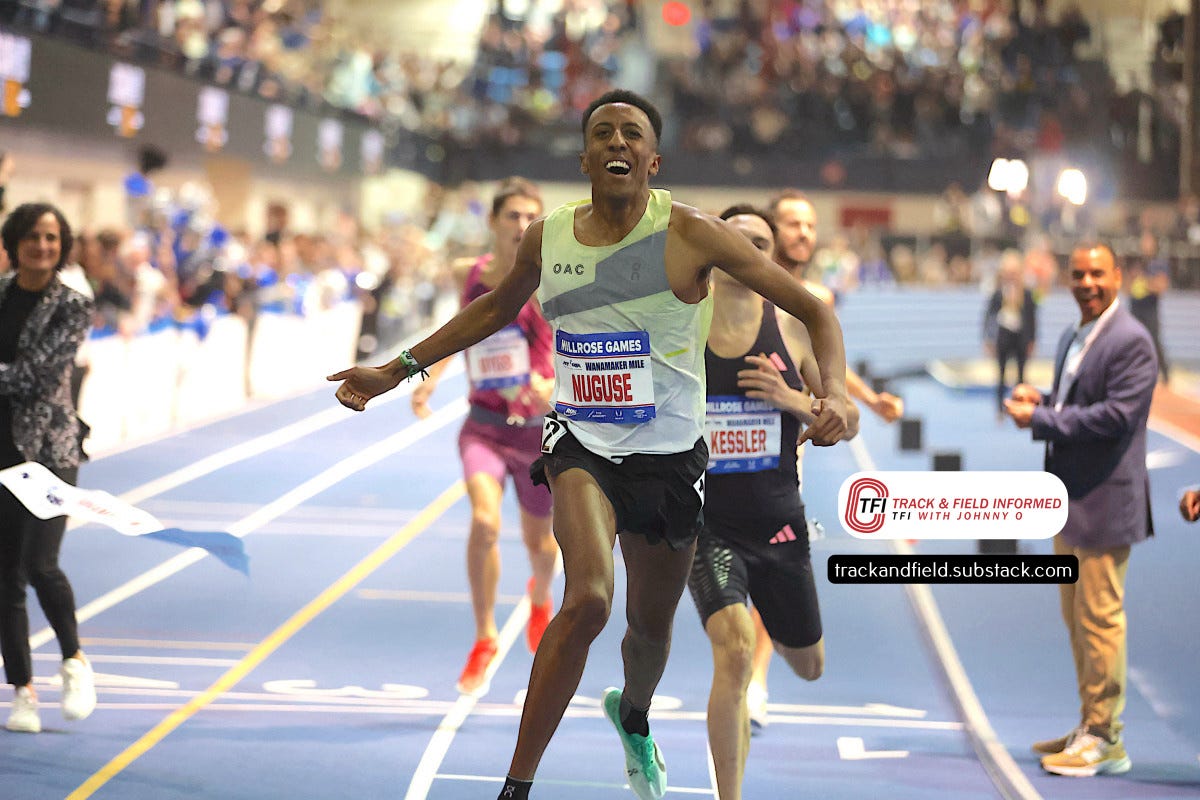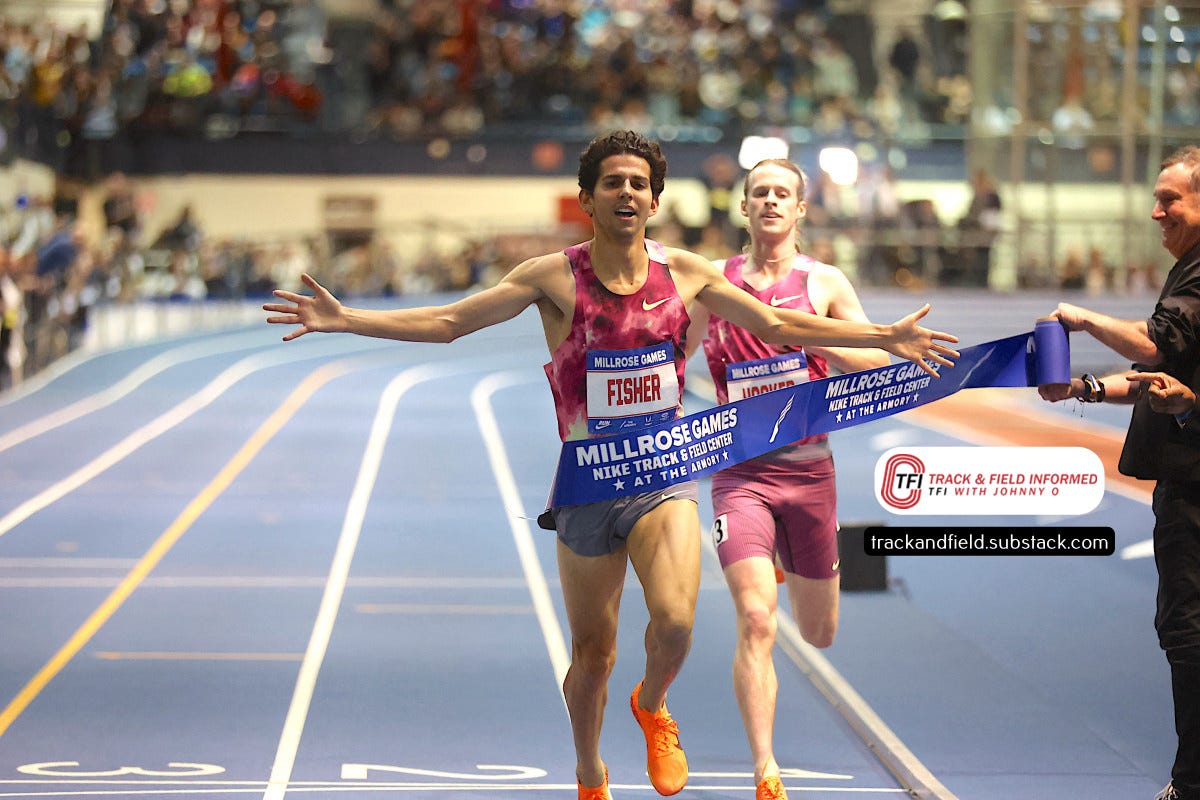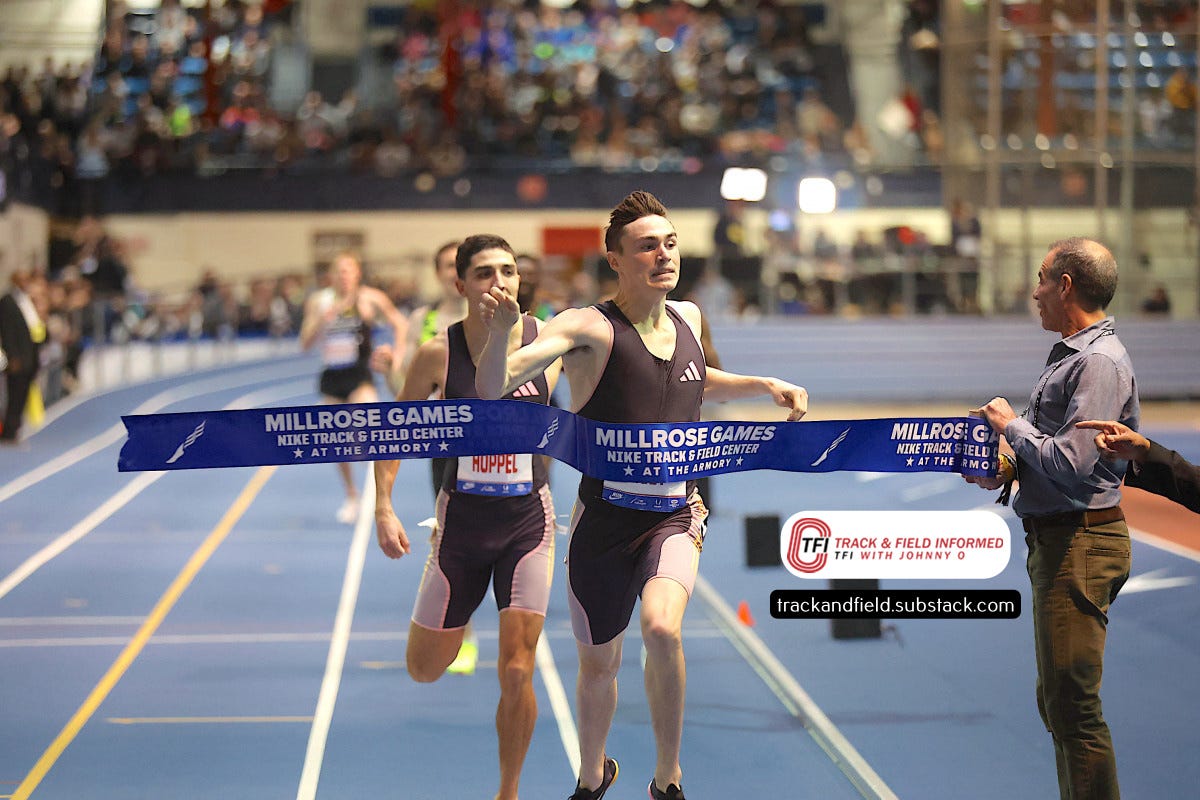A Millrose Games to remember
Americans Nuguse and Fisher set world records in mile, 3,000 in iconic meet

Yared Nuguse and Grant Fisher, two Americans who combined to win three bronze medals in the Olympic Games in Paris last summer, set world indoor records in the men’s mile and 3,000 meters, respectively, in the 117th edition of the Millrose Games in New York City on Saturday.
The 25-year-old Nuguse, who placed third in the Olympic 1,500-meter final, capped the meet by running 3:46.63 in the men’s Wanamaker Mile while racing on the newly resurfaced 200-meter oval at the Nike Track & Field Center at The Armory.
His time broke the previous world record of 3:47.01 set by Ethiopian Yomif Kejelcha in Boston in 2019 and led the greatest mass finish in the history of the event indoors as fellow American Hobbs Kessler finished second in 3:46.90 in a race in which the first eight finishers ran under 3:50.
The 27-year-old Fisher, who won bronze medals in both the 5,000 and 10,000 meters in Paris, clocked 7:22.91 in the 3,000 in a race that was held about 70 minutes before the mile. His time shaved nine tenths of a second off the world record of 7:23.81 that had been set by Ethiopian Lamecha Girma in Lievin, France, in 2023.
Olympic 1,500-meter champion Cole Hocker of the U.S. also bettered Girma’s mark with a 7:23.14 effort, but he could not hold off Fisher during the final 40 meters of the historically deep race as the top six finishers ran under 7:31.
“It’s absolutely insane,” Nuguse said when Lewis Johnson of NBC Sports asked him to explain his feelings shortly after he had become the first runner in 70 years to set a world record in the men’s mile in the Millrose Games. “I haven’t had a world record yet in my career and I’ve always really wanted one, just so I felt like, especially in the mile, I was good enough for it. Now I’m finally going to come away with it. So this feels amazing.”
Nuguse, who had run 3:47.38 and 3:47.83, respectively, in winning the Wanamaker Mile the previous two years, had been expected to clash with Olympic 1,500-meter silver medalist Josh Kerr of Great Britain. But Kerr withdrew from the race after reportedly becoming ill during the night.
Nuguse quickly moved into second place after the contest began on Saturday and he stayed there while pacesetter Abe Alvarado went through the first 440 yards in 57.17 seconds, the 880 in 1:53.02, and the one-kilometer mark in 2:20.49.
Kessler, Robert Farken of Germany, Azeddine Habz of France, and 18-year-old Cameron Myers of Australia were Nuguse’s closest pursuers when he passed the 1,320-yard mark in 2:50.23.
Nuguse’s supreme effort began to show on his face with 300 meters left in the race and his grimace was even more pronounced as he headed into the final curve of the last lap with Kessler still in hot pursuit of him. However, he held his form well through the finish line to become the first American to set a world record in the indoor mile since Dick Buerkle ran 3:54.93 in 1978.
While the 21-year-old Kessler’s second-place time of 3:46.90 cut nearly two seconds off his previous best of 3:48.66 that he had set while finishing behind Nuguse in last year’s Wanamaker Mile, Myers moved up two places during the last lap to finish third in 3:47.48, followed by Habz in 3:47.56, and University of Virginia junior Gary Martin in 3:48.82.
Neil Gourley of Great Britain placed sixth in 3:49.22, followed by Andrew Coscoran of Ireland in 3:49.26 and Farken in 3:49.93.
Myers’ Oceania record was the fifth-fastest time in history, moved him to fourth on the all-time performer list, and crushed his world U20 indoor mark of 3:53.12 that he had set in winning the Dr. Sander Scorcher meet on the same track two weeks earlier.
The European record by Habz was the sixth-fastest time ever run and moved him to fifth on the all-time performer list, with American Martin moving to eighth on the all-time performer list and to second on the all-time collegiate list after slashing more than six seconds off his previous best of 3:54.94 from two weeks earlier.
Gourley’s personal best moved him to 11th on the all-time performer list and Coscoran’s Irish record puts him at 12th.
The top eight finishers all recorded the fastest times ever run for their respective places.
Nuguse told Johnson that winning the bronze medal in the Olympic final behind Hocker and Kerr had given him a ton of confidence heading into this year.
“I always knew I was good, but I’d never really been able to do good on the world stage,” he said. “So getting to have that medal… just gave me all the confidence I needed to do awesome in ’25.
“It’s so amazing. And to get my threepeat here at the Wanamaker Mile. And also just to do it at an indoor race that I love so much. It just means the world to me.”
Like Nuguse, Fisher had never won a medal in an outdoor global title meet until the Olympic Games. But the 10,000 is currently considered to be his best event and the 3,000 is two kilometers shorter than the 5k.
Nonetheless, he had a run a personal best of 3:33.99 in the 1,500 while finishing second to fellow American Josh Hoey in the New Balance Indoor Grand Prix in Brighton, Massachusetts, last Sunday, and he was looking forward to testing himself against Hocker in the Millrose Games.
Fisher and Hocker were running in third and fourth place, respectively, when pacesetter Jack Salisbury came through the first kilometer in 2:28.83, and they were in second and third when No. 2 pacesetter Casey Comber brought the field through 1,600 meters in 3:57.88 and 1,800 in 4:27.95.
Fisher took over the lead after Comber dropped out shortly after that and he was followed closely by Hocker and Ky Robinson of Australia when he went through 2,000 meters in 4:58.01.
He also led the field past 2,200 meters in 5:27.81, but Hocker took the lead shortly before he passed 2,400 meters in 5:57.32.
Given Hocker’s superb finishing kick and his personal best of 3:27.65 in the 1,500, it would have been easy to assume he was in command of the race at that point. But Fisher immediately latched onto him after being passed and he was close behind him when Hocker clocked 6:26.39 at 2,600 meters and 6:55.25 with a lap to go.
Fisher was unable to get by Hocker going down the final backstretch, but he regrouped nicely around the final curve and launched another attack entering the home straightaway that led to him taking the lead with about 40 meters left in the race in which he ran his last lap in 27.50 seconds and his final 400 in 56.33.
Behind Fisher and Hocker, Jimmy Gressier of France finished third in a national record of 7:30.18, with Robinson setting an Oceania record of 7:30.38 in fourth.
Americans Dylan Jacobs and Cooper Teare followed in fifth and sixth place with personal bests of 7:30.45 and 7:30.62 while moving to seventh and eighth on the all-time U.S. performer list.
The top nine finishers set career bests, while Fisher became the first American to hold the world record in the 3,000 indoors since 1952 Olympic steeplechase champion Horace Ashenfelter clocked a hand-held time of 8:17.7 for 3k while on his way to a winning time of 8:53.3 for two miles in the 1954 Millrose Games.

“Man. A battle for the ages right there,” Fischer said to Johnson. “Cole is at the top of his game right now, so that’s a really good competitor and I’m glad I got the win over him. We ran fast and I’m really happy with that.”
Fisher admitted that Hocker is an “intimidating guy with a 400 to go.”
But he was thankful that he had taken the lead with three laps left in the race.
“He went that early and I could latch on and have something to chase again,” Fisher said. “I tried to get around him on the backstretch, he held me off. Tried to wait my time, and with 50 to go, going against [the] defending 1,500-meter gold medalist… It’s a little scary, but I pulled it off.”
In addition to the world records in the men’s mile and 3,000 meters, yearly world-leading marks were produced in six other events, topped by an American record of 1:43.90 in the men’s 800 by the aforementioned Hoey and a 1:14.04 effort by Will Sumner in the men’s 600.
Hoey, who finished fourth in the 800 in the U.S. Olympic Team Trials last year, had set a personal best of 3:52.61 in the mile, an American record of 2:14.88 in the 1,000, and another personal best of 3:33.66 in the 1,500 in winning his three previous races this season. And on Saturday, he ran the third-fastest indoor time in history in the 800 while turning back defending World indoor champion Bryce Hoppel of the U.S.
Hoppel, who set a U.S. outdoor record of 1:41.67 while finishing fourth in the 800 in the Olympic Games, was second in 1:44.19 on Saturday, followed by fellow American Jonah Koech in 1:44.82.
Sophomore Cooper Lutkenhaus of Northwest High in Justin, Texas, finished sixth in 1:46.86 to set a U.S. national prep record that bettered the previous mark of 1:47.67 set by Hoey when he was a senior at Bishop Shanahan High in Downington, Pennsylvania, in 2018.
Austin Rios-Colon of Columbia University and Puerto Rico paced the field through the first lap in 24.17 seconds, but Hoey was in the lead when he came through 400 meters in 51.01.
Hoppel was close behind Hoey when the former came through three laps in 1:17.64, but Hoey kept him at bay throughout the final 200 meters, which is when Hoppel often overtakes his fellow competitors.
“My strategy the whole time was to go out near the front and just try to lead wire to wire,” Hoey told Johnson. “I kind of just put myself on the line there, trust in God, and came through in a good time… it’s really a blessing.”
Sumner had capped his freshman season at the University of Georgia when he won the 800 in a personal best of 1:44.26 in the 2023 NCAA championships. But he was dogged by injuries last year.
After primarily focusing on the 400 during the early part of the indoor season, he led the field through the first 200 meters in 23.42 seconds and never trailed after that.
Brandon Miller and Isaiah Jewett were in second and third place, respectively, after Sumner came through 400 meters in 47.74, but they were unable to overtake him on the last lap as Jewett finished second in 1:14.17 and Miller was third in 1:14.37.
Junior Quincy Wilson of the Bullis School in Potomac, Maryland, finished fourth in 1:16.20 after setting a world U18 and U.S. national high school record of 45.66 in the 400 while winning that race in the New Balance Indoor Grand Prix.
Sumner’s winning time of 1:14.04 moved him to third on the all-time performer list, with Jewett moving to fourth, and Miller running the sixth-fastest time ever in the three-lap race.
The world best of 1:13.77 was set by Donavan Brazier of the U.S. in 2019, the same year he won the 800 in the World Athletics Championships in Doha, Qatar.
When asked about his strategy, Sumner said he “tried to just go out really hard, try to hold on, try to go out in 47 and then just see what I could do in that last lap.”
The other yearly world-leading marks in the meet were produced by Americans Masai Russell in the women’s 60-meter hurdles at 7.76 seconds, Dylan Beard in the men’s 60 high hurdles at 7.38, Jacious Sears in the women’s 60 at 7.02, and Katie Moon in the women’s pole vault at 4.82 meters (15 feet 9¾ inches).
Russell, the Olympic champion in the 100 hurdles, got out ahead of everyone in the 60 hurdles and finished well ahead of second-place Grace Stark, who ran 7.82.
Beard won his second consecutive Millrose title after beating all of his competitors out of the blocks and then finishing well clear of second-place Cordell Tinch, who ran 7.43.
Beard’s time was a personal best and put him in a four-way tie for eighth on the all-time U.S. performer list.
Sears had run a sparkling 10.77 for 100 meters for the University of Tennessee in April of last year, but an injury sustained in the Southeastern Conference championships in May ended her season.
Now running as a professional, she lowered her personal best in the 60 by nine hundredths of a second on Saturday, when her 7.02 clocking left her way ahead of second-place Celera Barnes, who ran 7.15, and moved her into a five-way tie for eighth on the all-time U.S. performer list.

Moon, the silver medalist in the Olympic Games in the pole vault after winning the gold medal in 2021, won her second meet of the year without a loss while adding two centimeters to her previous world-leading mark.
Moon cleared her opening height of 4.50 (14-9) on her second attempt before making 4.70 (15-5) on her first try and 4.82 (15-9¾) on her second. She then missed three attempts at 4.92 (16-1¾).
Whittni Morgan of the U.S. and Georgia Bell of Great Britain won the two longest women’s races as Morgan clocked 8:28.03 in the 3,000 meters and Bell ran 4:23.35 in the mile.
Morgan went from sixth place to first in the final two laps of the 3,000 as she ran her last 200 in 28.93 seconds, her final 400 in 60.28, and her third kilometer in 2:43.63.
Fellow American Josette Andrews finished second in 8:29.77, followed by Sarah Healy of Ireland in 8:30.79, Olympic 1,500-neter silver medalist Jessica Hull of Australia in 8:30.91, and Tsigie Gebreselama of Ethiopia in 8:33.13.
Morgan, Andrews, Healey, and Gebreselama all ran personal bests, with Healey’s a national record as well.
Morgan’s time moved her to fifth on the all-time U.S. performer list and Andrews’ effort put her in the No. 7 spot.
Morgan’s performance also came eight days after she had run a personal best of 14:48.41 in winning the 5,000 in the Boston University John Thomas Terrier Classic.
Bell, the Olympic bronze medalist in the 1,500, came from behind to win a mile race she described as messy.
The field had a lot of top runners in it, but no one went out with pacesetter Emily Richards, who was more than a second ahead of anyone else when she went through the first quarter-mile in 65.58 and she still had a sizeable lead when she passed the half-mile mark in 2:13.42.
Linden Hall of Australia was in first place when she came through the 1,320-yard mark in 3:20.82, but Bell moved from seventh to fourth during the next 200 meters before she picked up another three spots during the final lap of the track.
While Americans Heather MacLean and Nikki Hiltz placed second and third, respectively, with times of 4:23.41 and 4:23.50, senior Sadie Engelhardt of Ventura High in California set a U.S. high school record of of 4:27.97 while finishing 11th.
The previous record of 4:28.25 was set by Mary Cain when she was a junior at Bronxville High in New York City in 2013.
In addition, Engelhardt’s 4:09.84 split at 1,500 meters bettered the national prep record of 4:11.53 that she had set in the New Balance Indoor Grand Prix when she finished seventh in the mile in 4:29.34.





